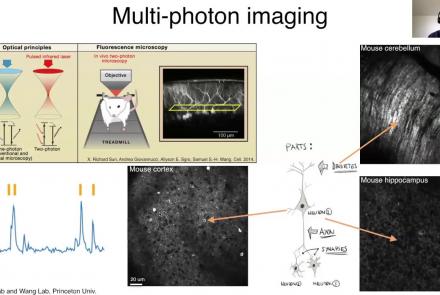Explore how to setup an epileptic seizure simulation with the TVB graphical user interface. This lesson will show you how to program the epileptor model in the brain network to simulate a epileptic seizure originating in the hippocampus. It will also show how to upload and view mouse connectivity data, as well as give a short introduction to the python script interface of TVB.
Difficulty level: Intermediate
Duration: 58:06
Speaker: : Paul Triebkorn
The epilepsy SP actively promotes and supports epilepsy-related issues as well as educational and scientific activities within the framework of EAN. Our partners ILAE/ILAE Europe, EpiCare, EPNS and AOAN are actively involved. One of the major tasks is promoting submissions of session proposals for EAN congress balancing new scientific approaches and educational need for teaching courses. Outside of congress activities, contributions to e-learning facilities on the EAN website such as registrars reading list, scales and scores and breaking news are regularly presented or updated. Particular since the COVID pandemic, publications on COVID and any issues of epilepsy or seizures are regularly screened and summarized in neurology updates. In partnership with the ILAE/ILAE Europe, several guidelines are under preparation.
Difficulty level: Intermediate
Duration: 14:56
Speaker: : Tim J. von Oertzen
This lesson goes over the basic mechanisms of neural synapses, the space between neurons where signals may be transmitted.
Difficulty level: Intermediate
Duration: 7:03
Speaker: : Marcus Ghosh
This lesson describes spike timing-dependent plasticity (STDP), a biological process that adjusts the strength of connections between neurons in the brain, and how one can implement or mimic this process in a computational model. You will also find links for practical exercises at the bottom of this page.
Difficulty level: Intermediate
Duration: 12:50
Speaker: : Dan Goodman
This lesson discusses a gripping neuroscientific question: why have neurons developed the discrete action potential, or spike, as a principle method of communication?
Difficulty level: Intermediate
Duration: 9:34
Speaker: : Dan Goodman
Following the previous lesson on neuronal structure, this lesson discusses neuronal function, particularly focusing on spike triggering and propogation.
Difficulty level: Intermediate
Duration: 6:58
Speaker: : Marcus Ghosh
This lesson gives an overview of the Brainstorm package for analyzing extracellular electrophysiology, including preprocessing, spike sorting, trial alignment, and spectrotemporal decomposition.
Difficulty level: Intermediate
Duration: 47:47
Speaker: : Konstantinos Nasiotis
This lesson provides an overview of the CaImAn package, as well as a demonstration of usage with NWB.
Difficulty level: Intermediate
Duration: 44:37
Speaker: : Andrea Giovannucci
This lesson gives an overview of the SpikeInterface package, including demonstration of data loading, preprocessing, spike sorting, and comparison of spike sorters.
Difficulty level: Intermediate
Duration: 1:10:28
Speaker: : Alessio Buccino
In this lesson, users will learn about the NWBWidgets package, including coverage of different data types, and information for building custom widgets within this framework.
Difficulty level: Intermediate
Duration: 47:15
Speaker: : Ben Dichter
Course:
Panel discussion by leading scientists, engineers and philosophers discuss what brain-computer interfaces are and the unique scientific and ethical challenges they pose. hosted by Lynne Malcolm from ABC Radio National's All in the Mind program and features:
- Dr Hannah Maslen, Deputy Director, Oxford Uehiro Centre for Practical Ethics, University of Oxford
- Prof. Eric Racine, Director, Pragmatic Health Ethics Research Unity, Montreal Institute of Clinical Research
- Prof Jeffrey Rosenfeld, Director, Monash Institute of Medical Engineering, Monash University
- Dr Isabell Kiral-Kornek, AI and Life Sciences Researcher, IBM Research
- A/Prof Adrian Carter, Neuroethics Program Coordinator, ARC Centre of Excellence for Integrative Brain Function
Difficulty level: Intermediate
Duration: 1:14:34
Course:
Panel of experts discuss the virtues and risks of our digital health data being captured and used by others in the age of Facebook, metadata retention laws, Cambridge Analytica and a rapidly evolving neuroscience. The discussion was moderated by Jon Faine, ABC Radio presenter. The panelists were:
- Mr Sven Bluemmel, Victorian Information Commissioner
- Prof Judy Illes, Neuroethics Canada, University of British Columbia, Order of Canada
- Prof Mark Andrejevic, Professor of Media Studies, Monash University
- Ms Vrinda Edan, Chief Operating Officer, Victorian Mental Illness Awareness Council
Difficulty level: Intermediate
Duration: 1:10:30
Topics
- Clinical neuroinformatics (7)
- Standards and Best Practices (2)
- Bayesian networks (1)
- Machine learning (9)
- Neuroimaging (6)
- EBRAINS RI (2)
- Neuromorphic engineering (3)
- Standards and best practices (4)
- Tools (11)
- Workflows (3)
- Brain-hardware interfaces (1)
- Clinical neuroscience (6)
- General neuroscience (9)
- Computational neuroscience (28)
- Statistics (3)
- Computer Science (2)
- Genomics (7)
- Data science (3)
- Open science (5)
- Project management (1)
- (-) Neuroethics (2)












